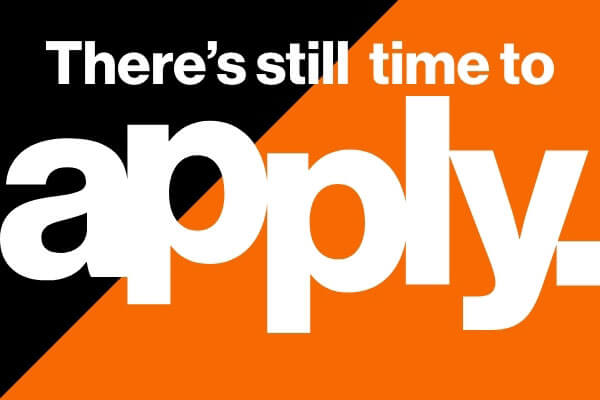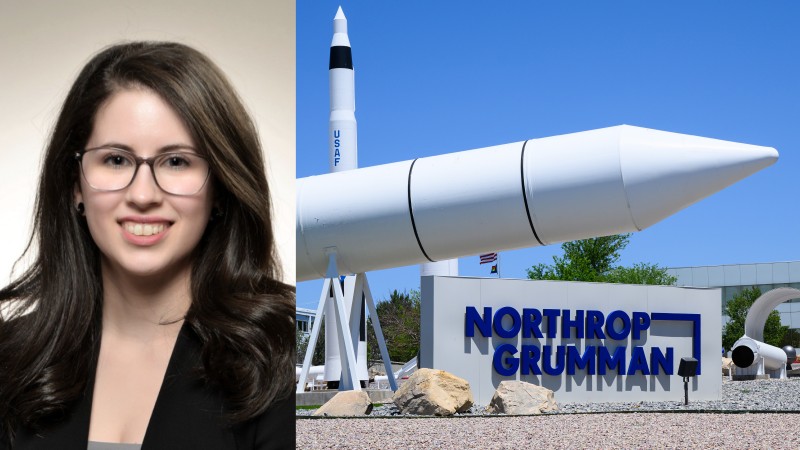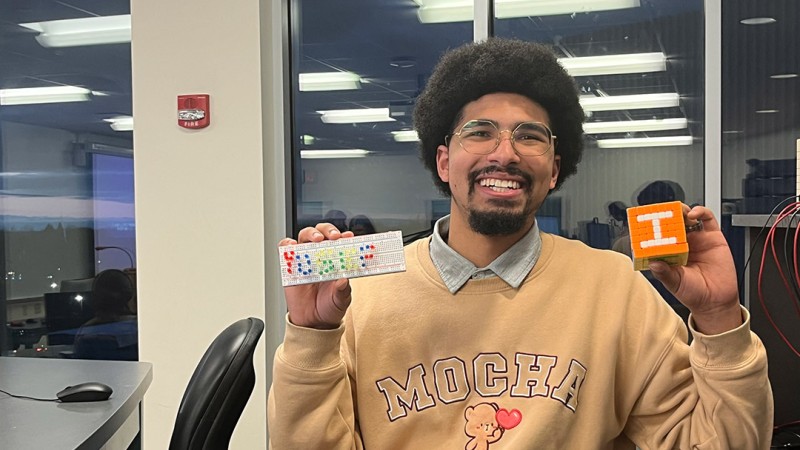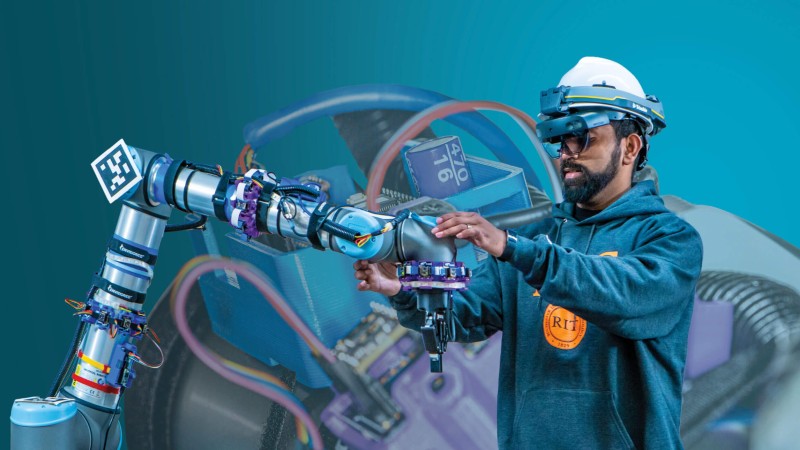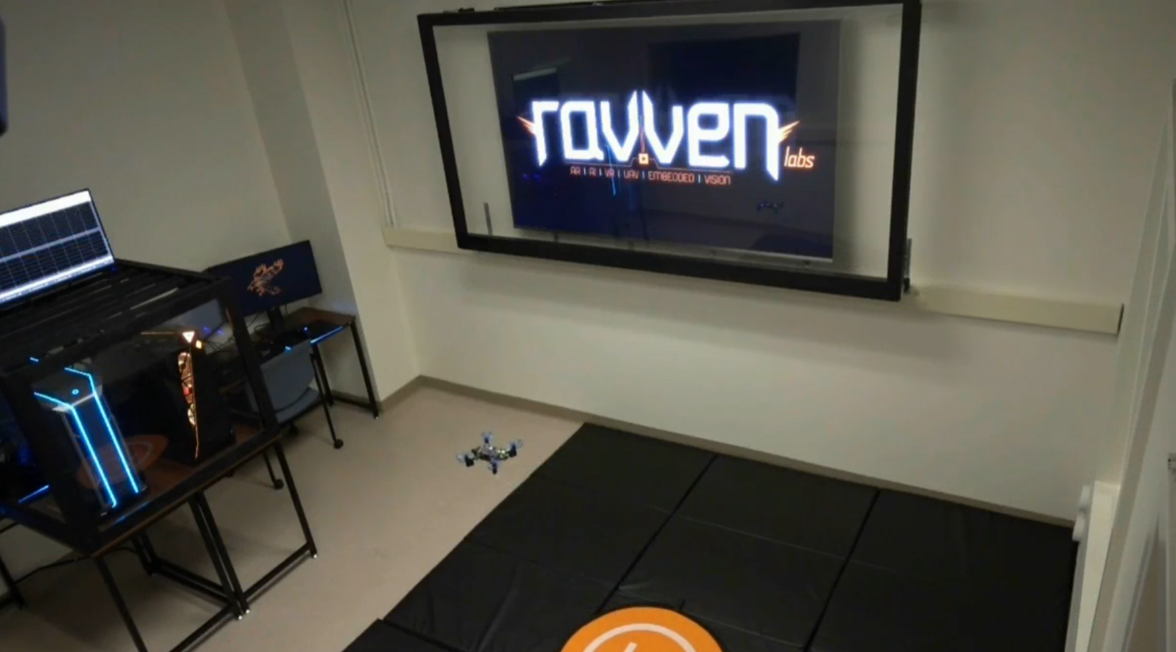Electrical Engineering Technology Bachelor of Science Degree
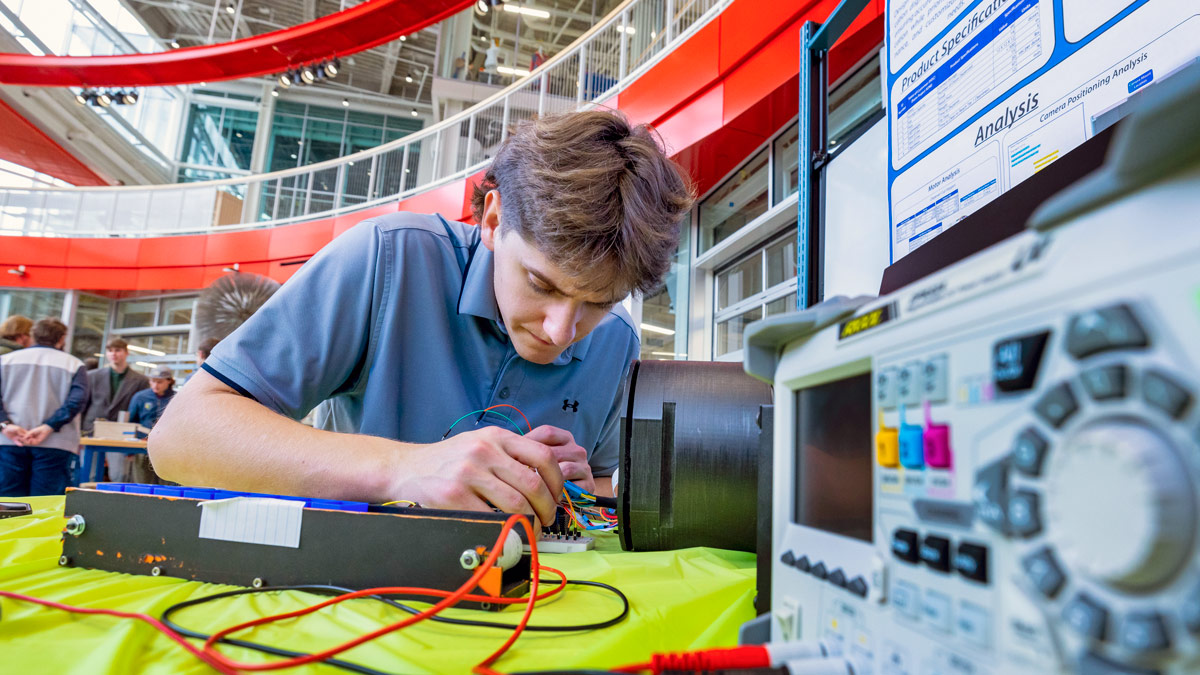
Electrical Engineering Technology
Bachelor of Science Degree
- RIT /
- Rochester Institute of Technology /
- Academics /
- Electrical Engineering Technology BS
Design and apply electrical systems with hands-on skills in electronics, circuits, and systems theory.
$79.7K
Average First-Year Salary of RIT Graduates from this degree
#4
Best Engineering Job: “Electrical Engineer”
100%
required courses in the College of Engineering Technology for this major have a lab component
Overview for Electrical Engineering Technology BS
Why Pursue an Electrical Engineering Technology Degree at RIT?
Gain Hands-On Experience: Four required blocks of cooperative education mean nearly a year of hands-on, full-time, paid work experience in the industry.
Focused Options: Choose from two professional options in either audio or wireless communications.
Strong Career Connections: Recent grads are employed at Lockheed Martin; Tesla; Northrop Grumman; General Motors; Department of Defense; Corning Incorporated.
STEM-OPT Visa Eligible: The STEM Optional Practical Training (OPT) program allows full-time, on-campus international students on an F-1 student visa to stay and work in the U.S. for up to three years after graduation.
RIT’s BS in electrical engineering technology is designed to meet industry’s ever-increasing need for engineers with an in-depth understanding of electrical and electronics theory. The electrical engineering technology degree also provides you with the ability to specialize in specific areas of the discipline.
Explore our Electrical Engineering Technology Curriculum
In your first two years of study, you’ll complete electrical engineering technology courses that provide you with a foundation in:
- Circuits
- Analog and digital electronics
- Physics
- Calculus
In the third and fourth years, you’ll expand your knowledge of fundamental skills with more advanced courses in:
- Advanced circuits and electronics
- Transform methods
- Control systems
- Analog and digital electronics
- Applied differential equations
You will also choose from multiple electives to round out your bachelor of science in electrical engineering technology. Electives include:
- Sequences in power systems
- Electronic communications
- Embedded systems
- Telecommunications
- Networking
- Optics
Electives are also available in other technical disciplines, and your academic advisor can assist in determining the elective courses that best meet your career goals and objectives.
In addition, a solid foundation in math, science, and the liberal arts, coupled with specialization in students’ particular areas of interest, prepares graduates to immediately enter the workforce as design engineers or pursue advanced degrees.
Specialization Options for Bachelor of Science in Electrical Engineering Technology
Students pursuing a bachelor's degree in electrical engineering technology who wish to specialize in a particular area of industry or pursue a personal interest may elect to use electives to complete a four-course option in audio or wireless communications.
Engineering vs. Engineering Technology
Two dynamic areas of study, both with outstanding outcome rates. Which do you choose?
What’s the difference between engineering and engineering technology? It’s a question we’re asked all the time. While there are subtle differences in the course work between the two, choosing a major in engineering vs. engineering technology is more about identifying what you like to do and how you like to do it.
Furthering Your Education in Electrical Engineering Technology
Today’s careers require advanced degrees grounded in real-world experience. RIT’s Combined Accelerated Bachelor’s/Master’s Degrees enable you to earn both a bachelor’s and a master’s degree in as little as five years of study, all while gaining the valuable hands-on experience that comes from co-ops, internships, research, study abroad, and more.
- +1 MBA: Students who enroll in a qualifying undergraduate degree have the opportunity to add an MBA to their bachelor’s degree after their first year of study, depending on their program. Learn how the +1 MBA can accelerate your learning and position you for success.
-
Join Us for Accepted Student Open House
Visit campus on March 28 or April 11 to meet faculty, tour campus, and ask your questions.
-
Join us for Fall 2026
There's still time to apply. For some programs, applications will be reviewed on a rolling, space-available basis.
Careers and Cooperative Education
Typical Job Titles
| Applications Engineer | Controls Engineer | Design Engineer |
| Electrical Engineer | Hardware Development Engineer | Power Distribution Engineer |
| Product Engineer | Project Engineer | Quality Engineer |
| Systems Engineer | Test Engineer |
Industries
-
Aerospace
-
Automotive
-
Computer Networking
-
Construction
-
Electronic and Computer Hardware
-
Medical Devices
-
Oil and Gas
-
Utilities and Renewable Energy
Cooperative Education
What’s different about an RIT education? It’s the career experience you gain by completing cooperative education and internships with top companies in every single industry. You’ll earn more than a degree. You’ll gain real-world career experience that sets you apart. It’s exposure–early and often–to a variety of professional work environments, career paths, and industries.
Co-ops and internships take your knowledge and turn it into know-how. Your engineering co-ops will provide hands-on experience that enables you to apply your engineering knowledge in professional settings while you make valuable connections between classwork and real-world applications.
Hands-On Experience Leads to Real World Skills
Students in the electrical engineering technology degree are required to complete four co-op blocks. This typically includes one spring, one fall, and two summer blocks. You’ll alternate periods of full-time study with full-time paid work experience in your career field. In some circumstances, other forms of experiential education (e.g., study abroad, research, military service) may be used to fulfill part of the co-op requirement. Each student is assigned a co-op advisor to assist in identifying and applying to co-op opportunities.
Featured Work and Profiles
-
Next-Gen Hearing: Assistant Professor is Training AI to Power Personalized Audio
Hwan Shim CET Assistant Professor Hwan Shim is building the next generation of personalized audio. Shim was recently awarded nearly $750,000 in NIH funding to develop technology that trains AI and machine...
Read More about Next-Gen Hearing: Assistant Professor is Training AI to Power Personalized Audio -
Launching Aerospace Innovation: An Alum's Journey to Leadership at Northrop Grumman
Casey, '17 Electrical Engineering Technology, reveals the hands-on education and crucial soft skills that paved her way to leadership in aerospace innovation.
Read More about Launching Aerospace Innovation: An Alum's Journey to Leadership at Northrop Grumman -
Alum Who Paved the Way for Siri Reveals What’s Coming Next
Kevin Surace '85 (electrical engineering technology) was interviewed on The Jeff Bullas Show podcast, discussing the future of AI, digital twins, and the jobs most at risk (and most safe) in...
Read More about Alum Who Paved the Way for Siri Reveals What’s Coming Next -
Student Develops Mentoring Program for Peers
In just the past year, Yusef, Electrical Engineering Technology major and RIT performing arts scholar, founded a peer mentoring program called Student Engineering Professionals (SEP), completed a...
Read More about Student Develops Mentoring Program for Peers -
Engineering Enthusiast Inspires Future Innovators
Kenzie Moore Electrical engineering technology student Kenzie Moore makes a difference by volunteering with Engineering Up, a program to ignite K-12 students' passion for STEM through hands-on learning and...
Read More about Engineering Enthusiast Inspires Future Innovators -
RIT Researchers Push Boundaries of Human-Robotic Interactions
Ferat Sahin, Jamison Heard, Yangming Lee Several RIT faculty researchers are pushing the boundaries of human-robotic interactions.
Read More about RIT Researchers Push Boundaries of Human-Robotic Interactions
Curriculum for 2025-2026 for Electrical Engineering Technology BS
Current Students: See Curriculum Requirements
Admissions and Financial Aid
This program is STEM designated when studying on campus and full time.
First-Year Admission
First-year applicants are expected to demonstrate a strong academic background that includes:
- 4 years of English
- 3 years of social studies and/or history
- 3 years of math is required and must include algebra, geometry, and algebra 2/trigonometry. Pre-calculus is preferred.
- 2-3 years of science. Chemistry or physics is required and biology is recommended.
- Technology electives are preferred.
Transfer Admission
Transfer applicants should meet these minimum degree-specific requirements:
- A minimum of college algebra is required. Pre-calculus or calculus is preferred.
- Chemistry or physics is required.
Financial Aid and Scholarships
100% of all incoming first-year and transfer students receive aid.
RIT’s personalized and comprehensive financial aid program includes scholarships, grants, loans, and campus employment programs. When all these are put to work, your actual cost may be much lower than the published estimated cost of attendance.
Learn more about financial aid and scholarships
Accreditation
Resources
Access Resources for students including academic advisors, student clubs and organizations, documents, technical information and support, and software help.
Related News
-
February 5, 2026

Co-op course helps students break into competitive industries
The Independent Professional Development course was developed last year to reflect fluctuations in the current job market and to support students who, despite their best efforts, have not yet secured co-ops.
-
October 9, 2025

Career fair connects students with companies
Thousands of RIT students searched for co-ops and full-time employment at more than 230 local, regional, and national companies represented at the University-wide Career Fair on Oct. 8.
-
July 3, 2025
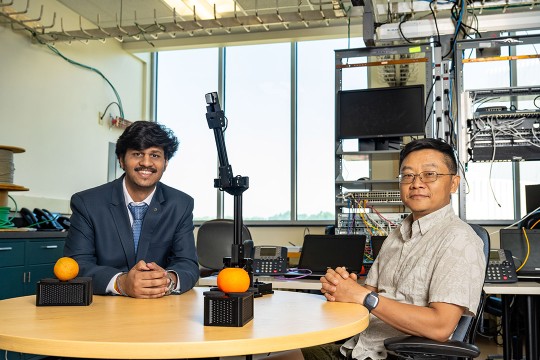
Visiting student joins RIT robotics lab and gets ‘dream’ experience
Aayush Kulkarni is participating in the International Visiting Research Student Program through RIT Global, which offers students from around the world the opportunity to collaborate with distinguished faculty-researchers from RIT.
Contact
- Martin K. Anselm
- Interim Department Chair
- Dean’s Office
- College of Engineering Technology
- 585‑475‑2005
- mkamet@rit.edu
Department of Electrical and Computer Engineering Technology











